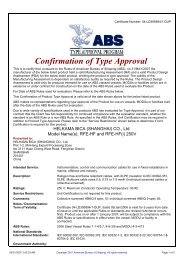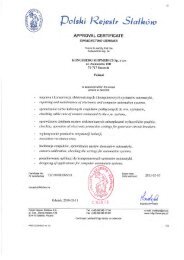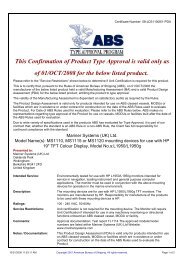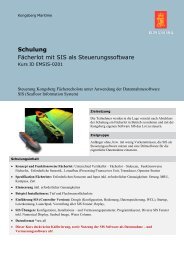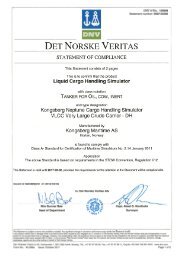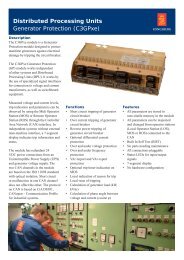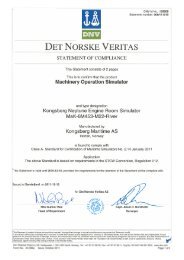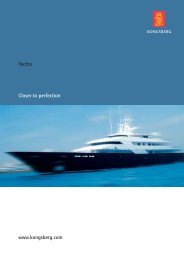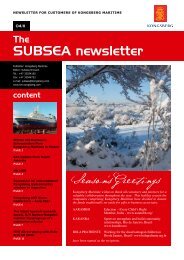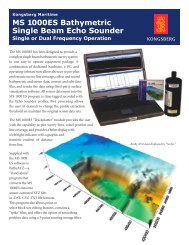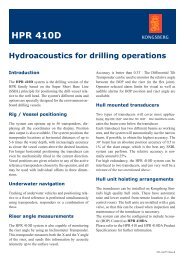Annual Report 2011 - Kongsberg Maritime - Kongsberg Gruppen
Annual Report 2011 - Kongsberg Maritime - Kongsberg Gruppen
Annual Report 2011 - Kongsberg Maritime - Kongsberg Gruppen
You also want an ePaper? Increase the reach of your titles
YUMPU automatically turns print PDFs into web optimized ePapers that Google loves.
2 INTRODUCTION<br />
7 DIRECTORS’ REPORT AND<br />
18 FINANCIAL STATEMENTS<br />
64 CORPORATE GOVERNANCE<br />
76 FINANCIAL CALENDAR AND ADDRESSES<br />
72<br />
KONGSBERG <strong>Annual</strong> <strong>Report</strong> <strong>2011</strong><br />
Ordinarily, there are eight meetings held each year.<br />
Additional meetings are held when considered necessary. In<br />
<strong>2011</strong>, there were 11 (9) board meetings. The Board meeting<br />
had 97 (95) per cent attendance in <strong>2011</strong>.<br />
All directors receive regular information about the<br />
Group’s operational and financial progress well in advance<br />
of the scheduled board meetings. The directors also receive<br />
monthly operations reports. The Group’s business plan,<br />
strategy and risk are regularly reviewed and evaluated by<br />
the Board. The directors are free to consult the Group’s<br />
senior executives as needed. The Board prepares and<br />
establishes an annual plan, including topics for the board<br />
meetings. Ordinarily, the CEO proposes the agenda for<br />
each board meeting. The final agenda is decided in consultation<br />
between the CEO and the Chairman of the Board.<br />
Besides the directors, board meetings are attended by<br />
the CEO, CFO, EVP Public Affairs, and the General Counsel<br />
(secretary of the Board). Other participants are called in as<br />
needed.<br />
The Board adopts decisions of particular importance to<br />
the Group, including the approval of the annual and<br />
quarterly accounts, strategies and strategic plans, the<br />
approval of significant investments (usually those in excess<br />
of MNOK 30), the approval of significant contracts and the<br />
approval of substantial business acquisitions and disposals.<br />
New directors are briefed on the Group’s current strategy<br />
and historical factors related to the current situation.<br />
Professional secrecy – communication between<br />
the Board and shareholders<br />
The Board’s proceedings and minutes are in principle<br />
confidential unless the Board decides otherwise or there is<br />
obviously no need for such treatment. This ensues from<br />
the rules of procedure for the Board of Directors.<br />
Expertise<br />
The entire Board has completed a programme to gain<br />
insight into the Group’s business activities. In that connection,<br />
the Board makes excursions to different Group<br />
locations. The purpose of the excursions is to improve the<br />
Board’s insight into the commercial activities in the area.<br />
Disqualification<br />
The Board is bound by the rules regarding disqualification<br />
as they appear in §6-27 of the Public Limited Companies<br />
Act and in the Rules of Procedure for the Board. In <strong>2011</strong>,<br />
one Board member has renounced due to disqualification in<br />
connection with two cases.<br />
Use of Board Committees<br />
The Board set up two subcommittees in 2005: An Audit<br />
Committee and a Compensation Committee.<br />
Both committees prepare items for consideration by the<br />
Board. They are responsible only to the entire Board and<br />
their authority is limited to making recommendations to the<br />
Board.<br />
The Board’s Audit Committee<br />
The Audit Committee has responsibilities related to financial<br />
reporting, the external auditor, internal audits and risk<br />
management. In <strong>2011</strong>, the Committee focused on the<br />
Group’s risk management. The Committee consists of two<br />
shareholder-elected directors and one employee-elected<br />
director. The external auditor usually attends the meetings.<br />
The CEO and the other directors are entitled to attend if<br />
they so desire. Six (six) meetings were held in <strong>2011</strong>.<br />
Members: John Giverholt (Chair), Anne- Lise Aukner, Kai<br />
Johansen. The mandate for the Audit Committee is on the<br />
Group’s website at www.kongsberg.com.<br />
The Board’s Compensation Committee<br />
The Committee addresses tasks linked to the CEO’s terms<br />
of employment, questions of principle related to wage<br />
levels, the bonus system, pension schemes/terms, employment<br />
contracts, etc. for executives, as well as other<br />
matters related to compensation that the Committee<br />
believes to be of special importance to the Group. The<br />
Committee consists of the Chairman of the Board, one<br />
shareholder-elected director and one employee-elected<br />
director. The CEO is entitled to participate in the Committee’s<br />
meetings if he so desires, except when his own<br />
situation is under discussion. Four (three) meetings were<br />
held in <strong>2011</strong>.<br />
Members: Finn Jebsen, Erik Must, Roar Marthiniussen.<br />
The mandate for the Compensation Committee is made<br />
available on the Group’s website at www.kongsberg.com.<br />
The Board’s self-evaluation<br />
The Board has one extended meeting each year to evaluate<br />
the work done by the Board and the CEO. In this connection,<br />
the Board also holds its own activities up for comparison<br />
with the Norwegian Code of Practice for Corporate<br />
Governance. Thus far, the Board has not found it necessary<br />
to use external consultants for the Board’s self-evaluation.<br />
The Board’s evaluation is made available to the Nominating<br />
Committee. Individual performance interviews are<br />
conducted each year between the Chairman of the Board<br />
and the other directors.<br />
10.Risk management and internal control<br />
The Board’s responsibilities and objectives of internal<br />
control<br />
KONGSBERG’s internal control and risk management<br />
system for financial reporting are based on the internationally<br />
recognized framework COSO.<br />
The Group has established a decentralized management<br />
model featuring delegated responsibility for profits. As a<br />
result, the control function parallels the Group’s management<br />
model, and is the individual unit’s responsibility to<br />
make sure that it has the capacity and expertise it requires<br />
to carry out proper internal control.<br />
A master management document has been adopted,




